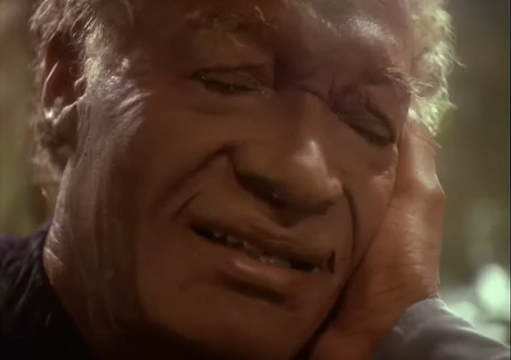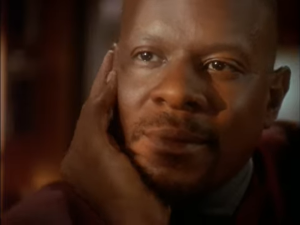Regular readers may know that I’ve been working my way through the Star Trek franchise in chronological order of release, and that aside from the movies, I’ve not been logging individual episodes in our daily What Did We Watch entries. WDWW threads feel like daily exercises for my critical faculties as this point – like a footballer running laps and practicing passes, with my essays here being The Big Game. Movies specifically are both more fun and generally more productive to talk about in the context of WDWW threads; it’s very rare that a movie feels like it has enough substance on its own to give more than two hundred and fifty words on the subject, especially in my initial emotional reaction, and generally I find the conversation that it sparks more rewarding than what I actually have to say. Episodes of comedies, of course, allow me to share jokes I thought were funny even if I have nothing to say about the plot in particular. Dramatic television – especially episodic dramatic television – rarely has the density to develop a critical response without the context of every episode around it.
But in this case, I responded so strongly and so profoundly to “The Visitor”, the second episode of the fourth season of Star Trek: Deep Space Nine, that I feel compelled to rush out a writeup on it. I suspect anyone who has seen the episode and knows enough details of my life would understand why I found it such a wounding and yet cathartic experience; the plot is that Ben Sisko appears to die in an accident, and his son Jake lives a long life in which he gradually works out Ben has been caught in a space-time anomaly that causes him to appear to Jake at random points and how to undo that. When I see Jake’s grief, awe, desperation, and love, I of course see my own feelings towards my own father reflected back at me, and I feel I have been given answer to me question of how much an audience can project onto an image vs a story with actual substance behind it.
As always, there’s a clever way for me to word it: it feels as if the exact meaning behind the story changes with every scene. There is, of course, a straightforward dramatic structure that stops this from floating away into complete incoherence, but it also finds astounding levels of nuance within its theme and prevents it from feeling totally stolid (the way every single scene in The Sopranos is a variation on “Lately I feel like I came in at the end of things.”). The opening scenes of an elderly Jake (played as an adult by the incomparable Tony Todd, who makes the emotions so much more intense) discussing Ben made me think of how I’ve been wondering how much and in what way I’ll be thinking of my father when I’m in my seventies or eighties. Ben’s reappearances in Jake’s life remind me of the times Dad has ‘reemerged’ how of the haze of his dementia from time to time – those brief moments of connection still possible.
Part of this feeling like actual connection instead of projection on my part is that these feelings are, if you’ll excuse the use of a corporate buzzword, actionable in a way lesser works do not provoke. Ben is disappointed by Jake’s grief-driven pursuit of the sciences at the expense of his own works and relationships; older Jake must die to bring his father back to life, which serves the TV-friendly purpose of restoring the status quo at the expense of feeling like some deep wrong has been committed, with the only real upside being that Ben can prevent that entire future from coming to pass at all. Ultimately, the best expression – not avoidance, but expression – of grief is a life well lived and personally fulfilling directions chosen, with the true happy ending not being that Ben was saved but that Jake wrote more stories. This, again, is a reflection of an actual story in which a character is making decisions.
The other reason this feels like real substance is because I can see outside myself in this episode. For one thing, I can see my mother almost as easily as I see my father in Ben; I’m particularly struck by the way his initial reluctance to accept Jake’s decision not to go into Starfleet has flowered into grief that Jake would give up his writing to save Ben. I can also see how a parent might be equally affected by this episode – Ben’s horrified delivery of “You’re so much older than me!” at the very end is haunting, even harrowing. In a general sense, I can see how existentially horrifying it might be to see one’s child older than oneself; this also works as a physical expression of seeing one’s child waste their life degrading themselves in sacrifice to the parent in question. As a rule, parents don’t like their children dying before them, and I can see this as a reminder of the ways a parent can destroy their child.



